Fleet Manager Duties And Responsibilities - Best Practices
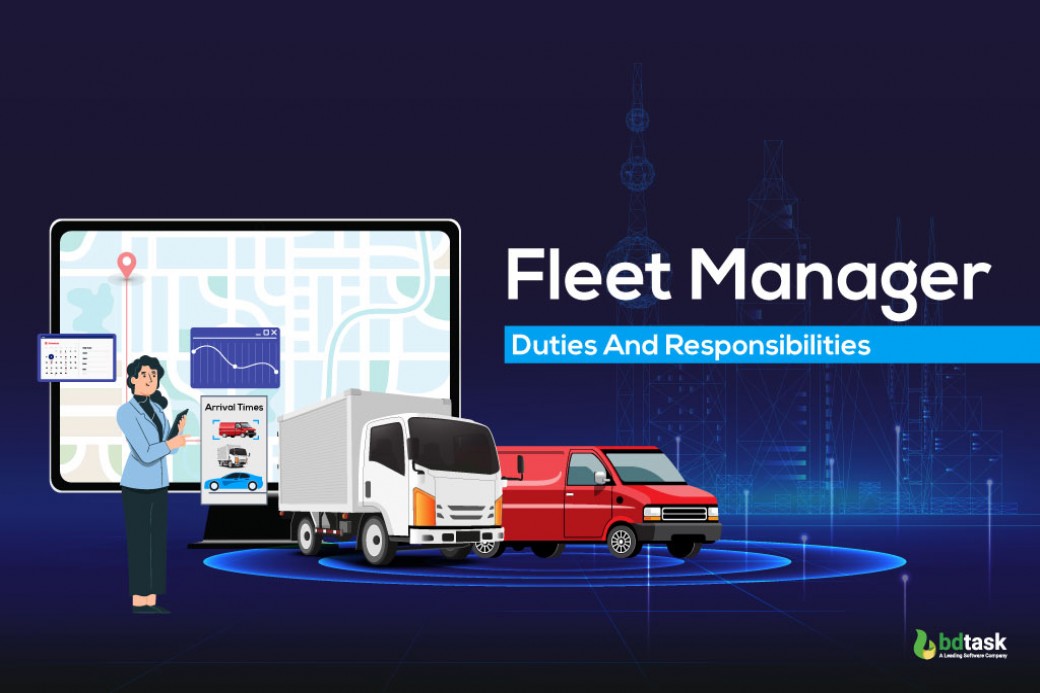
To improve productivity, security, compliance, and safety, and reduce costs, Fleet Manager Duties And Responsibilities play a great role. Fleet managers are logistics experts in the vehicle industry. A Fleet Manager, or Fleet Maintenance Supervisor, guides a team of Drivers to transport company goods efficiently and safely. Have you ever thought about how items get delivered on time? From the warehouse to the Customer's house, there is much work to complete the overall process.
A fleet manager is an expert who manages every segment — big or small— helping each task stay on track to complete business goals.
Whether you're a seasoned fleet manager or just starting, this blog will provide valuable insights and practical direction to assist you in succeeding in this challenging but rewarding job.
What Is Fleet Management?
Fleet management is a broad term, but Managing all information about the company's work-related vehicles and other assets, from purchase through disposal, is about fleet management. The process aims to maintain a company's entire lifecycle of commercial vehicles.
Fleet managers control all the processes to monitor fleet activities and make decisions about proper asset management, dispatch and routing, and vehicle acquisition and disposal. Fleet management helps ensure a fleet meets compliance requirements, continuously improves efficiencies, and reduces costs. Let's get a brief about a fleet manager and take a breakdown slowly—fleet manager duties and responsibilities.
What Is A Fleet Manager?
A fleet manager is a professional Superman who is responsible for managing a company's fleet of vehicles, including
- Cars
- Trucks
- vans
- other vehicles.
A fleet manager's primary goal is to ensure that the company's vehicles operate efficiently and effectively, overseeing everything from vehicle maintenance and fuel consumption to driver safety and regulatory compliance.
A fleet manager is also responsible for making strategic decisions about the company's fleet. The Fleet manager is also responsible for replacing vehicles and hiring drivers. The fleet manager is the decider of whether the vehicle is safe or not on the road. A good fleet manager maintains all the criteria of a fleet and ensures profitability and maximum efficiency.
What Exactly Does A Fleet Manager Do?
A fleet manager is a professional Superman who is responsible for managing a company's Fleet of vehicles, including
- Cars
- Trucks
- vans
- other vehicles.
A fleet manager's primary goal is to ensure that the company's vehicles operate efficiently and effectively, overseeing everything from vehicle maintenance and fuel consumption to driver safety and regulatory compliance.
A fleet manager is also responsible for making strategic decisions about the company's Fleet. The Fleet manager is also responsible for replacing vehicles and hiring drivers. The fleet manager decides whether the vehicle is safe or not. A good fleet manager maintains all the Fleet criteria and ensures profitability and maximum efficiency.
Challenges Faced by a Fleet Manager
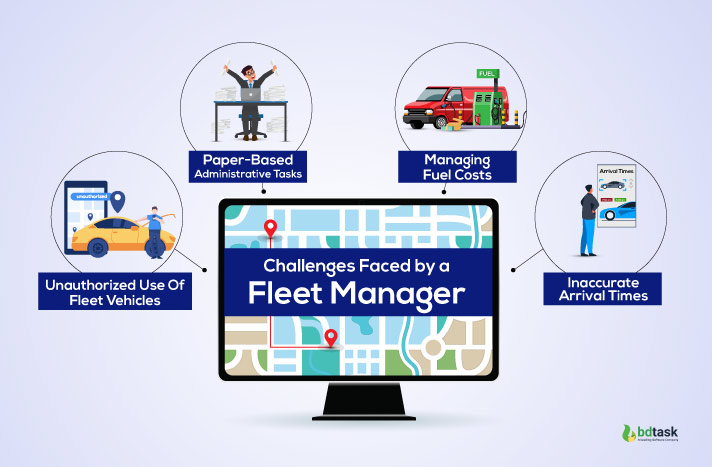
When anyone has a task to complete, there are always some challenges. In that sense, fleet managers also have a job to perform. So from morning till night, the fleet manager faces many challenges, so let's enroll in it.
1. Managing Fuel Costs
Fuel costs can be a significant part of any fleet's operating budget. Proper fuel management is one of the core facets underpinning the position of a fleet manager. Many fleets need more time, knowledge, or resources to manage fuel consumption properly. As a fleet manager, managing the Fleet's fuel cost is one of the most worrying subjects. Fluctuating fuel costs can make it difficult to predict how much Fuel will cost at any given time.
¼ of a fleet's total cost is allocated to Fuel.
And so, the more fuel you waste, the more money is wasted, thereby equating to a negative economic impact on businesses. To maximize the utilization of this ever-important resource, cutting down on fuel wastage is the most direct & effective course of action.
2. Paper-Based Administrative Tasks
40% of fleet managers waste their time doing administrative work. Manage all the tasks are Fleet manager duties and responsibilities. Very few people love to do administrative tasks, and as a fleet manager, you probably don't either. Tasks such as quoting, invoicing, dispatching, keeping customers informed, scheduling fleet maintenance, and other tasks can take up much of your time.
In the long run, it can contribute to other fleet management issues, including reduced productivity and less time to focus on revenue-generating tasks.
Paper-based systems also add a layer of administrative tasks to your day and keep you from handling other fleet problems.
3. Unauthorized Use Of Fleet Vehicles
Unauthorized use Of Fleet Vehicles means when a driver uses a fleet vehicle for their purpose. Sometimes when the fleet manager is busy with other work, the driver does this kind of unauthorized work and misuses work privileges. Sometimes driver uses their fleet vehicle to use it their own needs. It's a bad practice for any fleet driver. Sometimes vehicles could be unavailable when its needs.
Trusting your employees is important, but you may want extra protection when something seems unusual.
Trusting your employees is important, but you may want extra protection when something seems unusual.
The result fleet manager faces below problem:-
- If someone uses company vehicles without permission, you may be partly responsible for paying insurance fees or traffic fines if the driver gets in an accident. It occurs at an extra cost for your Fleet.
- Since drivers are completing side jobs on the same tank, unauthorized vehicle use guides to higher fuel costs.
- Unauthorized fleet trips raise the need for routine maintenance appointments, which can be costly.
4. Inaccurate Arrival Times
Your Customer Depends on you.
Small problems in a large enterprise can often go unnoticed by fleet managers for an extended period; sometimes, these problems are only found after a major crisis or incident that can seriously affect the company.
Your customers count on you to be on time and need you to communicate with them if something drives a delay. When you provide accurate arrival times, it can positively affect your business's reputation.
When customers think you are irresponsible and can't be trusted, they will take their business elsewhere. So it's a serious problem for any fleet manager.
While it may not be possible to give the exact time, customers expect to know within a pre-defined margin of error when to expect their delivery or service.
And if there is a delay, they expect to be notified with an updated ETA as soon as possible. Sometimes fleets manager are too busy to do other stuff, so they Forget to inform customers. After all, fleet managers, not AIbots.
Duties of A Fleet Manager
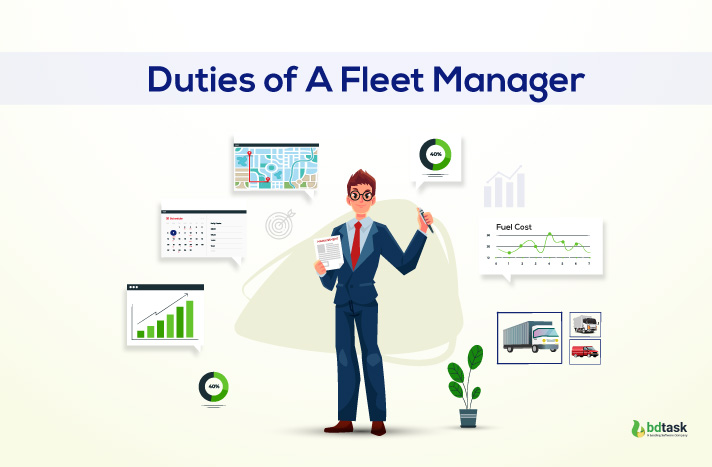
Fleet manager duties and responsibilities are a big term to explain, but it makes a huge difference in any fleet. what are the duties and responsibilities of a fleet manager let's check them out.
1. Vehicle Scheduling and real-time information
Real-time information plays an important part in any business maintenance strategy. A fleet manager does several types of maintenance duties. One of the main duties and responsibilities is vehicle scheduling and maintaining real-time information. Maintenance management is an integral part of building a healthy business ecosystem.
Fleet managers ensure their vehicles are in excellent shape for performing various tasks. Consider how it's important for their vehicles to deliver products and services at a low cost successfully. Fleet managers set up a maintenance schedule to ensure the vehicles in their fleets are properly maintained. Regular monitoring and real-time information give a fleet many benefits. Let's check them out
- Increased driver safety
- Regular maintenance cuts your overall Extra costs
- Increase your vehicle lifespan
- Improve maintenance workflows
2. Route planning
Maintaining accurate route planning is one of the tough Fleet manager duties and responsibilities. Accurate and effective route management improves fleets' productivity and maximizes the number of deliveries. A well-planned route needs to ensure several variables, such as the shortest route or that all customers receive their goods at the specified time. A fleet manager does all those plans. Proper planning of the route gives you some extra benefits, which are
- By finding the best possible match between plan and execution, fleet managers find better business planning.
- Proper route planning help to reach your customer satisfaction.
- Helpful for fuel consumption.
3. Examine Record Data
Vehicles are regularly creating data, and fleet managers are obvious to manage and control increasing quantities of information. Sometimes a fleet manager needs to examine the previous data to help them find a better solution.
Big Data is one of the popular Buzz words.
They identify possible problems from this previous information besides rerouting vehicles or changing a travel schedule when needed. As a result, drivers save travel time because they use routes with less traffic or road hazards. But, examining fleet record data, fleet managers use some tricks to ensure the positive output of the examination.
- The very Frist one is Vehicle age and mileage by type
- The very last one is How much Fuel is used by a vehicle
4. Take the Right Decision At the Right Time
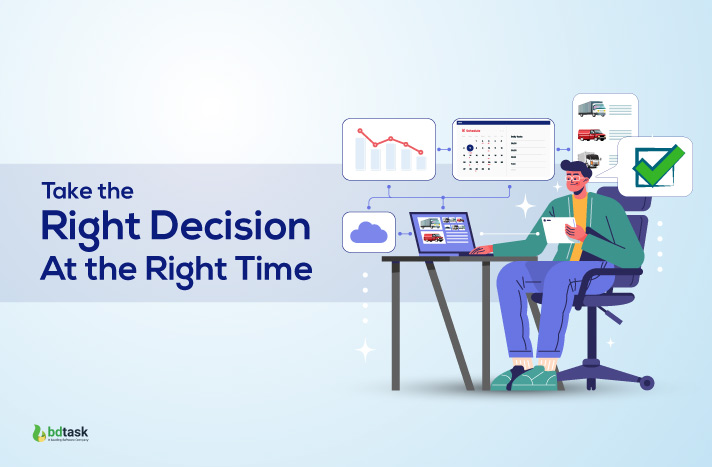
What is the most important decision for a fleet manager?
The answer is to take the right decision.
Fleet managers take many kinds of decisions in one day. But taking the right decision is quite tough. The right decision is to change the whole game for a fleet manager.
The fleet manager might take some of the most important decisions during on-time duty like:-
- You'll need to decide what kind of vehicles to purchase and how many, and several factors, including the age of your Fleet, maintenance, and the need, will influence this.
- It's the fleet manager's job to decide when and where vehicles are maintained. Is it always at the same service station? Do you always need vehicle manufacturer-approved vendors? How do you know when a vehicle needs maintenance?
- You must ensure your drivers are dedicated and do their job properly, avoid accidents too often, don't stop for long lunches, and normally are the best. That's an important decision, and Human Resources will need to be involved, so you can be sure references are checked and documents confirmed.
5. Managing And Training
Skilled drivers must maintain schedules and drive efficiently using the designated routes. However, if the staff is unskilled, fleet managers are tasked with furnishing them with on-job training to guarantee that they can execute their tasks in an orderly manner.
Unskilled drivers can cause fines, speeding tickets, and, worse cases, cases for reckless driving. While it can often cost Fleet managers valuable time conducting training sessions, it enables smoother operations in the long run.
What Makes A Good Fleet Manager?
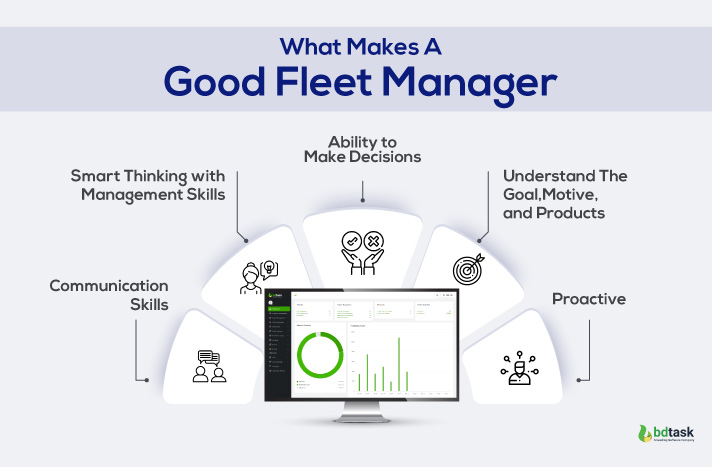
Every fleet has room for improvement
Although requirements vary between organizations, most fleet management positions need similar fleet manager skills. Some of these skills are natural, and some you can develop through training courses or certifications. Awareness of your skills and intentionally developing additional ones can assist you in becoming a more effective fleet manager. After knowing the Fleet manager's duties and responsibilities, it's time to explore what makes a good fleet manager.
Five basic skills that make you a good fleet manager.
1. Ability to Make Decisions
Great, Good fleet managers can make decisive decisions, large and small. They have the spirit and knowledge to make those decisions on the spot. Daily phone calls and e-mails bring countless small problems that need to be fixed, requiring fleet managers to have the ability to think on their feet, make decisions, and act quickly.
2. Understand The Goal, Motive, and Products
A good fleet manager fully understands corporate products and programs
A good fleet manager fully understands corporate products and programs.
A good fleet manager is always concerned about his boss's fleet company's goals, motives, and products. Fleet manager duties and responsibilities are important, but a good, skillful fleet manager also needs for fleets. You need to understand your company goal to get productivity and compete with your competitors.
Good and skillful Fleet knows their company's business. They are willing to manage at a "company impactful" level rather than simply "Fleet impactful. A great fleet manager can link strategic business objectives to the management of the Fleet.
3. InnovativeThinking with Management Skills
A great and good fleet manager must be creative in their working pattern. Even if fleet managers don't have the resources, creative fleet managers think of a way to do it. Fleet managers must be in control of well-developed critical and cognitive thinking skills. A fleet manager must be collaborative with some of the stakeholders. Creativity and an incredible amount of drivers are common denominators. Great fleet managers are also good delegators.
4. Proactive
Good fleet managers are proactive with problems. It indicates that they don't wait until something becomes an issue—they set themselves in their drivers' shoes and act now instead of reacting to situations after they arise.
5. Communication Skills
A good fleet manager must be a master of communication skills.
A fleet manager must have strong communication skills. A large part of their role is managing personnel and drivers, so they work to be efficient spoken and written communicators. Fleet managers are also usually great at giving brief instructions. Strong communication skills also help managers communicate effectively in presentations when reporting to upper management.
Become A Smart Fleet Manager
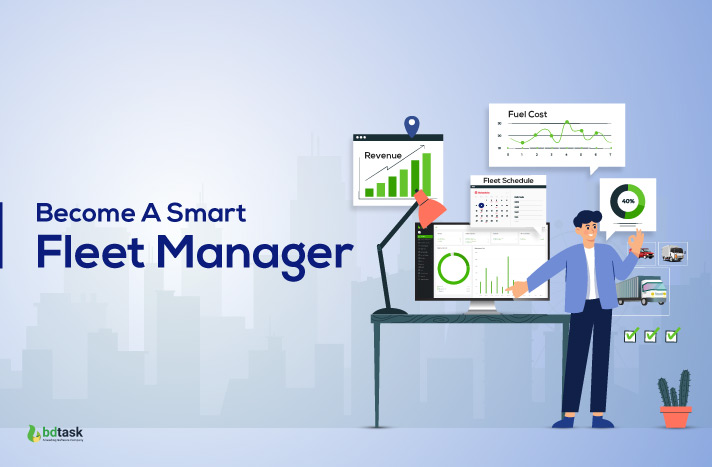
The most efficient way for fleet managers to increase their productivity is by outsourcing their time-consuming administrative tasks, like registration, fuel cards, invoicing, driver expenses, quoting, and ordering. So now understand all those things like skills and Fleet manager duties and responsibilities, what do you think? Knowing all those staffs, every fleet managers are quite skillful and proactive, but something needs to be added.
Think Smart and be Digital and be Smart
Every day fleet managers did a lot of staff and a lot of tension in their heads. But using a vehicle management system (VMS), fleet managers find an Aladdin Chirag. A vehicle management system that can help monitor all the tasks like magic.
The vehicle management system is the game changer for any fleet manager.
Improve your fleet lifecycle, track your vehicle through a GPS tracker, and know the vehicle's location, driving style, route deviations, or driver idle times all the things covered by vehicle management software. All the daily life limitations faced by a fleet manager have gone away just by using a fleet management system. If anyone wants to customize their fleet management software to their requirement, then a Custom Software Development Service Company like BDtask is the right choice for their fleet company.
Endnote
By lowering costs, providing savings, and handling policies and operations that impact revenue and the bottom line, fleet managers will continue to be respected contributors and play an integral role in organizations. Fleet manager duties and responsibilities are more accurately done when a fleet manager can also use a fleet software solution—software that will help fleet managers' working experience be more accurate, smoother, and more accessible than ever before.
By reducing costs, generating revenue, and saving money, fleet management will continue to be essential to companies with fleets. And fleet management software will continue to help fleet managers deliver.










